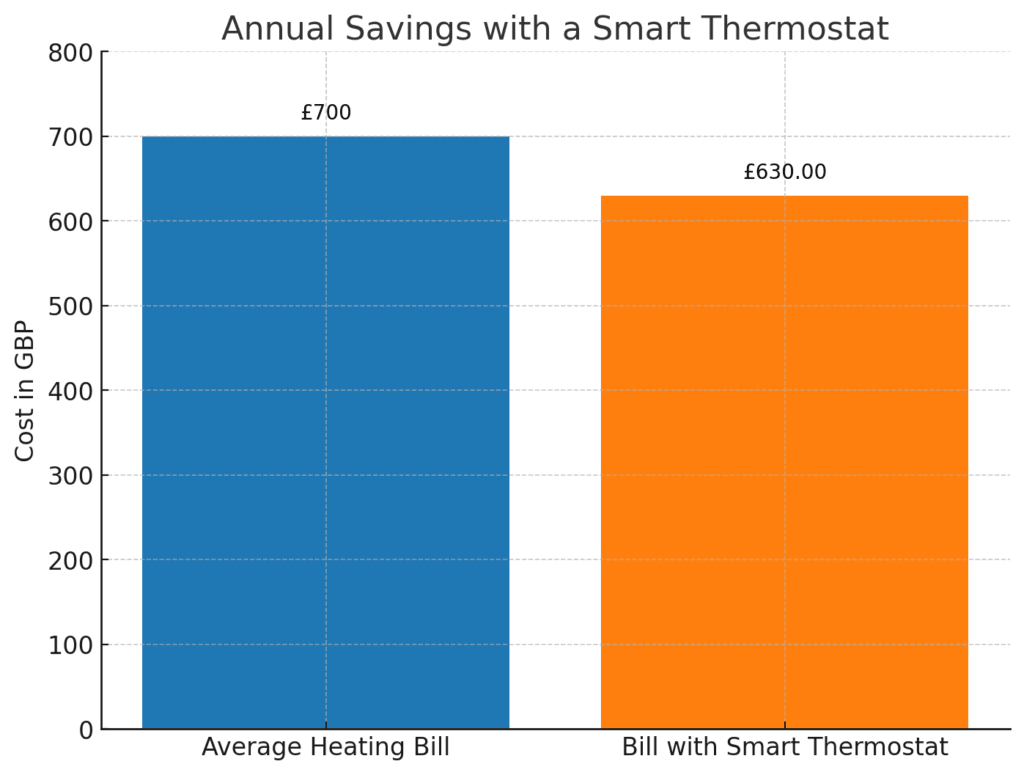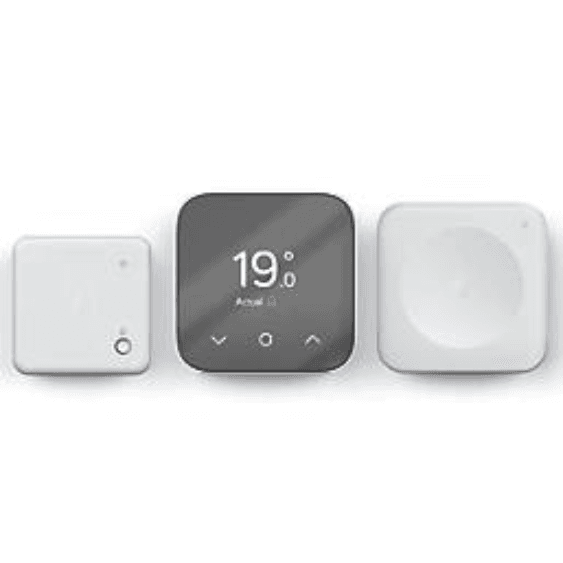The Benefits of Smart Controls!Unlocking Efficiency and Comfort: The Benefits of Smart Controls in Modern Heating Systems. The Benefits of Smart Controls!
In today’s digital age, smart technology isn’t just for our phones, lights, or entertainment systems; it’s transforming how we control our home environments as well. Smart heating controls—such as smart thermostats, smart thermostatic radiator valves (TRVs), weather compensation, and flue gas recovery units—are revolutionizing residential and commercial heating systems by enhancing energy efficiency, comfort, and convenience. Let’s delve into the benefits of these innovative smart controls and explore how they’re helping create comfortable spaces with reduced energy consumption and costs.
Below are just a few ways we at GGB Heating Solutions Ltd can help you save money on your energy bills.
Smart Thermostats: Personalizing Temperature and Saving Energy
Smart thermostats are internet-connected devices that allow users to monitor and control their heating systems remotely. They go far beyond traditional thermostats by learning a user’s behavior, automatically adjusting heating schedules, and providing insights into energy usage patterns.
Benefits of Smart Thermostats:
Energy Usage Insights: Most smart thermostats provide detailed insights and reports on energy usage, helping users identify opportunities to cut down on heating costs. Over time, these insights can lead to significant energy savings.
Energy Savings: Smart thermostats adapt to your routine, optimizing when and how much heating is required based on occupancy. For example, if you’re away, the thermostat can lower the temperature, reducing unnecessary energy use. Many smart thermostats report a 10-12% reduction in heating bills.
Remote Control: With app-based access, you can adjust the temperature from anywhere, meaning you won’t waste energy heating an empty home. You can warm up the house before you arrive, ensuring comfort and efficiency.
Scheduling and Automation: Smart thermostats allow you to create heating schedules that match your daily routine. Many models also feature geofencing, which detects when you’re near home and adjusts the temperature accordingly.
According to the UK’s Energy Saving Trust, smart thermostats can reduce heating bills by approximately 10-12% by adjusting heating schedules based on occupancy and behavioural patterns. The average UK household heating bill is around £600-£800 per year, so this translates to savings of around £60-£96 annually.
Chart 1: Annual Savings with a Smart Thermostat

Let’s create a chart to showcase the estimated savings.
Annual Savings with a Smart Thermostat
The chart above shows how a smart thermostat can lower annual heating costs from an average of £700 to around £630, saving approximately £70 per year.


Smart Thermostatic Radiator Valves (TRVs): Zone Heating for Ultimate Comfort
Smart TRVs take heating control to the next level by allowing for zone-based heating, so each room can be controlled independently. This level of precision helps maintain comfort in individual spaces and avoids the waste associated with overheating certain areas.
Benefits of Smart TRVs:
Integration with Smart Thermostats: When paired with a smart thermostat, TRVs can optimize the heating system further by communicating and coordinating with the thermostat, creating an integrated heating network that ensures comfort and efficiency.
Room-by-Room Control: Smart TRVs enable users to set different temperatures in different rooms. For instance, you might prefer a warm bedroom at night but a cooler living room. This level of control can create a more comfortable environment for every member of the household.
Reduced Energy Waste: By heating rooms only when necessary, smart TRVs prevent wasteful heating of unused spaces. This not only conserves energy but also lowers utility bills. For larger homes, the savings can be substantial.
Automatic Adjustment: Many smart TRVs use occupancy sensors to detect when a room is empty, automatically lowering the temperature until the room is in use again. This feature is especially useful in rooms with fluctuating occupancy, like home offices or guest rooms.
Smart Thermostatic Radiator Valves (TRVs): Financial and Energy Savings
Smart TRVs offer additional savings by allowing room-specific control. This zoned heating approach can reduce heating bills by 8-10%, especially in larger homes where not all rooms are in constant use. Assuming an average saving of 9% on a £700 heating bill, a household could save around £63 annually.
Chart 2: Estimated Annual Savings from Smart TRVs
Let’s illustrate these savings with another chart.
Annual Savings with Smart TRVs

The chart above illustrates that using smart TRVs can reduce annual heating costs from £700 to approximately £637, resulting in savings of about £63 per year.
Weather
Compensation: Adjusting Heating Based on Outdoor Conditions
Weather compensation controls are advanced sensors that adjust your boiler’s temperature output based on outdoor weather conditions. This innovative system measures the temperature outside and optimizes the heating output, ensuring that your home is consistently comfortable without excessive energy consumption.
Benefits of Weather Compensation:
Lower Heating Bills: Weather compensation has been shown to reduce fuel consumption by up to 10-20%, as the boiler operates more efficiently based on real-time environmental conditions. This decrease in energy consumption directly translates into lower heating costs.breakdown.
Improved Efficiency: By adjusting the boiler’s output according to outside temperatures, weather compensation reduces the chances of overheating the home. For instance, on a mild day, less heat is required to reach the same level of comfort indoors, saving energy.
Enhanced Comfort: Weather compensation creates a more stable indoor climate. It prevents the temperature fluctuations that often occur when indoor heating is based solely on indoor conditions, leading to greater consistency and comfort.
Longer Boiler Lifespan: By operating at optimal output levels, the boiler experiences less strain, leading to fewer breakdowns and a longer lifespan. The boiler doesn’t need to turn on and off as frequently, reducing wear and tear.
Weather Compensation Controls: Financial Benefits
Weather compensation controls can reduce energy costs by adjusting the boiler output based on outdoor temperature, leading to potential energy savings of 10-20%. For a household with a £700 heating bill, savings can range from £70 to £140 annually.
Chart 3: Estimated Annual Savings with Weather Compensation Controls
This chart will demonstrate the potential savings range from using weather compensation.
Annual Savings with Weather Compensation Controls

The chart above shows the potential savings from weather compensation controls, ranging from £70 to £140 annually, depending on the efficiency achieved.

Flue Gas Recovery Units: Capturing and Reusing Wasted Energy
Flue gas recovery units (FGRUs) are another valuable addition to modern heating systems. These devices capture waste heat from the boiler’s exhaust gases and repurpose it to preheat the water in the system. Instead of allowing this heat to escape through the flue, FGRUs redirect it, enhancing overall efficiency.
Benefits of Flue Gas Recovery Units:
Compatibility with Various Systems: Flue gas recovery technology is compatible with many high-efficiency boilers, making it an accessible option for enhancing existing systems. It’s a simple and effective way to improve efficiency without a complete system overhaul.
Enhanced Efficiency: FGRUs recover up to 5-10% of the energy from exhaust gases, significantly improving the overall efficiency of the boiler. By capturing wasted energy, they make the heating system more sustainable.
Reduced Energy Bills: This recovered heat lowers the demand on the boiler, which can reduce fuel usage by 4-6%. For households and businesses alike, these savings can add up substantially over time.
Lower Carbon Emissions: By making better use of the fuel burned, FGRUs contribute to reducing carbon emissions. For those looking to make their heating systems more eco-friendly, FGRUs are a smart choice.
Flue Gas Recovery Units: Financial and Environmental Benefits
Flue gas recovery units can improve boiler efficiency by 5-10%, capturing and reusing energy from exhaust gases. For a £700 annual heating bill, this can save between £35 and £70 per year.
Chart 4: Estimated Annual Savings with Flue Gas Recovery Units
Here’s a visualization of the savings range for flue gas recovery units.
Annual Savings with Flue Gas Recovery Units

The chart above highlights potential savings with flue gas recovery units, ranging from £35 to £70 per year.
The Bigger Picture: Combining Smart Controls for Maximum Benefit
Each smart heating control device offers unique advantages, but their benefits are amplified when combined. A system that integrates smart thermostats, TRVs, weather compensation, and flue gas recovery can reduce energy usage by up to 30%. Here’s why a connected approach is advantageous:
- Seamless Efficiency: Smart thermostats and TRVs ensure that each room’s temperature is optimized, while weather compensation keeps the overall system balanced with outdoor conditions. Flue gas recovery adds an additional layer of efficiency, reducing the load on the boiler.
- Improved Comfort: With smart controls working together, comfort is maximized across the home. Each room is individually adjusted, and temperature fluctuations are minimized, creating a cozy, consistent atmosphere.
- Sustainability and Cost Savings: The energy saved from using smart controls translates into lower utility bills and a reduced carbon footprint. For environmentally conscious consumers, this is a big win—smart heating controls make it easy to align household comfort with sustainability goals.
Making the Transition: Considerations for Integrating Smart Controls
For those looking to integrate smart heating controls, a few considerations can help make the process smooth and effective:
- Compatibility: Ensure that your heating system is compatible with smart controls. Most systems can be upgraded with minimal adjustments, but checking for compatibility can save time and prevent compatibility issues.
- Choose a Comprehensive System: Many brands offer interconnected smart control ecosystems, which can be easier to manage. Look for systems that allow seamless integration of thermostats, TRVs, and other smart controls.
- Set Realistic Goals: While smart heating controls offer substantial savings, setting realistic expectations is important. Gradual energy reductions accumulate over time, making them a worthwhile investment for long-term savings.
- Professional Installation: For advanced systems, such as weather compensation or flue gas recovery, professional installation may be necessary to ensure proper setup and optimal functioning.
Final Thoughts: The Future of Heating is Smart
Smart heating controls are paving the way for efficient, comfortable, and eco-friendly homes. By investing in these technologies, homeowners can reduce energy costs, enhance their comfort, and minimize their environmental impact. From the ease of remote control with smart thermostats to the targeted efficiency of smart TRVs, weather compensation, and flue gas recovery units, smart controls represent the future of heating systems—one that aligns comfort with conservation. Whether upgrading a single component or integrating a complete smart heating system, these controls offer a forward-thinking approach to managing the modern home.
Conclusion: Combined Savings of Smart Heating Controls
When these smart controls are integrated, their cumulative effect can lead to significant savings. Here’s an estimated range for the total annual savings when combining these smart controls, showing the substantial financial impact they can have on a typical UK household’s heating bill.
Potential Combined Savings:
- Low Estimate: 25% (around £175)
- High Estimate: 42% (up to £294)
Integrating these smart heating solutions not only enhances comfort and efficiency but also offers substantial financial returns and reduces environmental impact through lower energy consumption and carbon emissions.
